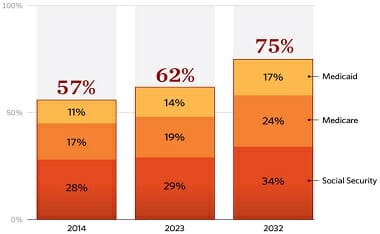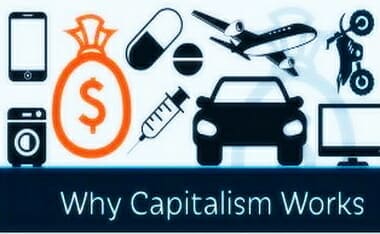Is “campaign finance reform” a good way to regulate money in politics? Nationally syndicated, Pulitzer Prize-winning columnist and best-selling author George Will shows that, despite the innocent name given by its proponents, campaign finance reform is really a euphemism for controlling free speech. If the goal is to get money out of politics, the real solution is to get politics out of money. In other words, shrink government. In five minutes, learn the truth.
Prager U


How to Solve America’s Spending Problem ~ PragerU
Everyone complains about America’s debt, and rightly so, but how do we get out of it? As Cato’s Michael Tanner explains, spending on entitlement programs — Social Security, Medicare and Medicaid — has exploded in recent decades. We must slow their growth or they will soon swallow the entire federal budget. In five minutes, learn how America can preserve these programs and get out of debt.

Rachel “Left of Mao” Maddow Vs. Myths and Mantras (UPDATED!)
(Alex Castellanos ended up writing a response to his above “tiff” with Maddow) This is partly an import from a previous post dealing with this topic via my old blog, and partly an update. In my original post entitle, Glass Ceilings, Veteran benefits, and Other Liberal Mantras, I chronicled the following:
The Glass Ceiling
President Clinton said that women make .73 cents on every man’s dollar. He used this as a campaign issue to try and smear Republicans. Kerry said that women make .76 cents on every man’s dollar, and likewise used this stat as a political smear. The question then is this, are these two persons correct?
YES! If you compare all men to all women, then yes, there is a disparage. This stat doesn’t take into account a few things. It doesn’t consider the fact that women tend to choose the humanities when entering college and men seem to choose the hard sciences. So by choice women tend to choose professions that pay less. Not only that, when you compare Oranges to Oranges, you get something much different than expected, or that we would expect from the liberal side of things. If a woman and a man have had the same level of education and have been on the same job for an equal amount of time, the woman makes $1,005 while a man makes $1,000, a difference of $5 dollars every thousand dollars a man earns.
So part of the problem — exemplified by this article in the NYT’s by a woman Medical Doctor — is the amount of time put into the career versus a male counterpart:
…But the productivity of the doctors currently practicing is also an important factor. About 30 percent of doctors in the United States are female, and women received 48 percent of the medical degrees awarded in 2010. But their productivity doesn’t match that of men. In a 2006 survey by the American Medical Association and the Association of American Medical Colleges, even full-time female doctors reported working on average 4.5 fewer hours each week and seeing fewer patients than their male colleagues. The American Academy of Pediatrics estimates that 71 percent of female pediatricians take extended leave at some point — five times higher than the percentage for male pediatricians.
This gap is especially problematic because women are more likely to go into primary care fields — where the doctor shortage is most pronounced — than men are. Today 53 percent of family practice residents, 63 percent of pediatric residents and nearly 80 percent of obstetrics and gynecology residents are female. In the low-income areas that lack primary and prenatal care, there are more emergency room visits, more preventable hospitalizations and more patients who die of treatable conditions. Foreign doctors emigrate to the United States to help fill these positions, but this drains their native countries of desperately needed medical care.
If medical training were available in infinite supply, it wouldn’t matter how many doctors worked part time or quit, because there would always be new graduates to fill their spots. But medical schools can only afford to accept a fraction of the students who apply…
Continuing with the medical profession example, the L.A. Times [partly] correctly pointed out that many women look for these lower paying jobs because they allow for greater (family rearing) flexibility:
…The answer, they speculate, is that women are choosing lower-paying jobs on purpose because they offer greater flexibility in hours and are generally more family-friendly. The researchers acknowledge they don’t have the data to prove that this is the case, but the data they do have is consistent with this theory.
If so, they say, that would be a victory for women (and even men.) Studies show that many doctors are burned out and would rather take jobs that allow them to have a good quality of life. Now — thanks in large part to the growing ranks of female doctors — such jobs are available. They just come with lower salaries.
“Instead of being penalized because of their gender, female physicians may be seeking out employment arrangements that compensate them in other — nonfinancial — ways, and more employers may be beginning to offer such arrangements,” the researchers wrote….
Women Earn More Than Men-About 8% More-All Things Equal (Liberal Mantra’s)
…..Thomas Sowell is the most well written on this subject. In fact, in his book, Economic Facts and Fallacies, he devotes a whole chapter to this topic. In one area he points the following out, and keep in mind that in most countries mining or other hard-labor jobs are much more the norm than in America:
…various countries’ economies, there are still particular industries today where considerable physical strength remains a requirement. Women are obviously not as likely to work in such fields as men are— and some of these are fields with jobs that pay more than the national average. While women have been 74 percent of what the U.S. Census Bureau classifies as “clerical and kindred workers,” they have been less than 5 percent of “transport equipment operatives.” In other words, women are far more likely to be sitting behind a desk than to be sitting behind the steering wheel of an eighteen-wheel truck. Women are also less than 4 percent of the workers in “construction, extraction, and maintenance.” They are less than 3 percent of construction workers or loggers, less than 2 percent of roofers or masons and less than one percent of the mechanics and technicians who service heavy vehicles arid mobile equipment.
Such occupational distributions have obvious economic implications, since miners earn nearly double the income of office clerks when both work full-time and year-round 20 There is still a premium paid for workers doing heavy physical work, as well as for hazardous work, which often overlaps work requiring physical strength. While men are 54 percent of the labor force, they are 92 percent of the job-related deaths.
He goes on to point out that this volunteerism of choices continues onto Ph.D.s,
Given the asymmetrical effects of career obsolescence on women and men, it is hardly surprising that women tend to work in fields with lower rates of obsolescence— as teachers and librarians, for example, rather than as computer engineers or tax accountants. Even as the proportion of women receiving Ph.D.s rose dramatically from the 1970s on, male-female differences in the fields of specialization remained large. As of 2005, for example, women received more than 60 percent of the doctorates in education but less than 20 percent of the doctorates in engineering.
He then goes on to point out that do to life choices based on being close to family [kids], and choices made around work and family:
The most important reason why women earn less than men is not that they are paid less for doing the very same work but that they are distributed differently among jobs and have fewer hours and less continuity in the labor force. Among college-educated, never-married individuals with no children who worked fill-time and were from 40 to 64 years old— that is, beyond the child-bearing years— men averaged $40,000 a year in income, while women averaged $47,000.30 But, despite the fact that women in this category earned more than men in the same category, gross income differences in favor of men continue to reflect differences in work patterns between the sexes, so that women and men are not in the same categories to the same extent.
Even women who have graduated from top-level universities like Harvard and Yale have not worked full-time, or worked at all, to the same extent that male graduates of these same institutions have. Among Yale alumni in their forties, “only 56 percent of the women still worked, compared with 90 percent of the men,” according to the New York Times. It was much the same story at Harvard:
A 2001 survey of Harvard Business School graduates found that 31 percent of the women from the classes of 1981, 1985 and 1991 who answered the survey worked only part time or on contract, and another 31 percent did not work at all, levels strikingly similar to the percentages of the Yale students interviewed who predicted they would stay at home or work part time in their 30’s and 40’s.
In fact, as of a few years ago, women make more of the enrollment statistics in college, but will, through life choices, spend less time on the job that they went to school for than their male counterparts. All this brings me full circle to a great article that updates the above via the Wall Street Journal. They point out that much of the emphasis on this are by special interest groups that want to fix the problem — in my mind’s eye — with outdated thinking that no longer fits the evidence. In a recent VIRAL article found at The Atlantic Monthly “Why Women Still Can’t Have It All,” Anne-Marie Slaughter talks about the talent businesses lose due to their inflexibility of allowing women to juggle family and work via a work schedule that doesn’t force an “either-or” schedule on them. BECAUSE when forced into an either-or situation, women choose family. Its in their nature. Here she talks a bit about her column:
Mona Charen, a favorite author of mine, columnist, and part of the Clare Booth Luce Institute (a conservative policy institute for women), comments on Slaughter’s article in her’s, “Grow up: Life Has Trade-offs,” by agreeing with her that women were sold a lie. Both in the prevailing view by the left that counters women’s nature as well as statistical lies:
…Even with a supportive husband who was willing to “take on the lion’s share of parenting … (while) I was in Washington,” she found that she didn’t want to be away from her two teenaged sons, particularly when one was having trouble in school.
“Want” is the critical word here. Slaughter made a choice, as adults do. She writes, “I realized that I didn’t just need to go home. Deep down, I wanted to go home. I wanted to be able to spend time with my children in the last few years that they are likely to live at home, crucial years for their development into responsible, productive, happy, and caring adults.”
Slaughter’s wants mirror those of other women (high-earning and otherwise). A 2007 Pew survey found that among working mothers with children 17 and younger, fully 79 percent said that they would prefer part-time (60 percent) or zero (19 percent) work outside the home. Only 21 percent said they would choose full-time employment while their children were young. This was down from 32 percent who preferred to work full time in 1997.
Despite endless repetition by Democrats and feminists, the idea that women earn less than men for the same work is fiction. Single women without children earn just as much, and sometimes more, than comparably qualified young men. Women earn less (over their whole careers) because they choose to. And they choose to because they place more value on child rearing than on money or status.
A better feminist would applaud women for this and stress the incomparable contribution mothers make to society. Instead, feminists define progress as the “first” woman this or that and the degree to which a woman’s life parallels a man’s. Feminists have been missing what’s best about womanhood for decades…
This is much of the left’s “padded” thinking mind you! the WSJ’s article, entitled,There Is No Male-Female Wage Gap: A study of single, childless urban workers between the ages of 22 and 30 found that women earned 8% more than men, is a great update to the above:
Tuesday is Equal Pay Day—so dubbed by the National Committee for Pay Equity, which represents feminist groups including the National Organization for Women, Feminist Majority, the National Council of Women’s Organizations and others. The day falls on April 12 because, according to feminist logic, women have to work that far into a calendar year before they earn what men already earned the year before.
In years past, feminist leaders marked the occasion by rallying outside the U.S. Capitol to decry the pernicious wage gap and call for government action to address systematic discrimination against women. This year will be relatively quiet. Perhaps feminists feel awkward protesting a liberal-dominated government—or perhaps they know that the recent economic downturn has exposed as ridiculous their claims that our economy is ruled by a sexist patriarchy.
The unemployment rate is consistently higher among men than among women. The Bureau of Labor Statistics reports that 9.3% of men over the age of 16 are currently out of work. The figure for women is 8.3%. Unemployment fell for both sexes over the past year, but labor force participation (the percentage of working age people employed) also dropped. The participation rate fell more among men (to 70.4% today from 71.4% in March 2010) than women (to 58.3% from 58.8%). That means much of the improvement in unemployment numbers comes from discouraged workers—particularly male ones—giving up their job searches entirely.
Men have been hit harder by this recession because they tend to work in fields like construction, manufacturing and trucking, which are disproportionately affected by bad economic conditions. Women cluster in more insulated occupations, such as teaching, health care and service industries.
Yet if you can accept that the job choices of men and women lead to different unemployment rates, then you shouldn’t be surprised by other differences—like differences in average pay.
Feminist hand-wringing about the wage gap relies on the assumption that the differences in average earnings stem from discrimination. Thus the mantra that women make only 77% of what men earn for equal work. But even a cursory review of the data proves this assumption false.
The Department of Labor’s Time Use survey shows that full-time working women spend an average of 8.01 hours per day on the job, compared to 8.75 hours for full-time working men. One would expect that someone who works 9% more would also earn more. This one fact alone accounts for more than a third of the wage gap.
Choice of occupation also plays an important role in earnings. While feminists suggest that women are coerced into lower-paying job sectors, most women know that something else is often at work. Women gravitate toward jobs with fewer risks, more comfortable conditions, regular hours, more personal fulfillment and greater flexibility. Simply put, many women—not all, but enough to have a big impact on the statistics—are willing to trade higher pay for other desirable job characteristics.
Men, by contrast, often take on jobs that involve physical labor, outdoor work, overnight shifts and dangerous conditions (which is also why men suffer the overwhelming majority of injuries and deaths at the workplace). They put up with these unpleasant factors so that they can earn more.
Recent studies have shown that the wage gap shrinks—or even reverses—when relevant factors are taken into account and comparisons are made between men and women in similar circumstances. In a 2010 study of single, childless urban workers between the ages of 22 and 30, the research firm Reach Advisors found that women earned an average of 8% more than their male counterparts. Given that women are outpacing men in educational attainment, and that our economy is increasingly geared toward knowledge-based jobs, it makes sense that women’s earnings are going up compared to men’s.
In a response to a reader in a previous blogpost on this subject, I pointed out that there are physiological differences between the sexes that are undeniable and that promote women making choices to pause a career and build a home life. Here is my response:
You should know that there is a hard wired difference between men and women, whether by evolutionary means or creative means. A most recent example is what wakes the sexes at night:
Psychologist Dr David Lewis said: ‘There is nothing more likely to leave you feeling drained and depressed than disturbed sleep, especially when this happens over several nights.
A graphic explaining the different sounds which will wake men and women
‘As this unique study shows while some sounds, for instance your partner coughing or snoring beside you, disturb men and women equally, other noises such as a howling wind cause men to be more disturbed than women.
‘Women are more likely to be disturbed by a crying baby.
‘These differing sensitivities may represent evolutionary differences that make women sensitive to sounds associated with a potential threat to their children while men are more finely tuned to disturbances posing a possible threat to the whole family.’
===========================
I could call my husband lazy, sexist and insensitive but his failure to hear a crying child while he’s sleeping might not be his fault at all. Researchers have actually found that women are hard-wired to wake up to the sound of a sobbing baby. A 2009 study by the British Mindlab sleeping lab found that a baby’s crying is the number one sound most likely to rouse a woman and didn’t even factor into the male top 10. Men were more likely to wake to the sounds of a car alarm, howling wind, or a buzzing fly.
This difference is what the market responds to. The fact that women typically WANT to be at home with their family MORE than the man… AND, women typically CHOOSE jobs that pay less. But free markets is not what the left is about, egalitarianism is.

Was it Wrong to Drop the Atom Bomb on Japan? (PragerU)
In recent years, many academics and others have condemned President Truman’s decision to use the atomic bomb on the Japanese cities of Hiroshima and Nagasaki as unnecessary and immoral. Yet this interpretation relies on a poor understanding of history that both lacks perspective and ignores context. Dropping the bomb shortened the war and saved countless lives — both American and Japanese. In five minutes, Professor of History at Notre Dame, Father Wilson Miscamble, explains.

Why Is Modern Art So Bad? ~ Robert Florczak
For two millennia, great artists set the standard for beauty. Now those standards are gone. Modern art is a competition between the ugly and the twisted; the most shocking wins. What happened? How did the beautiful come to be reviled and bad taste come to be celebrated? Renowned artist Robert Florczak explains the history and the mystery behind this change and how it can be stopped and even reversed.

Insulating Liberal Students To Opposing Views Hurts Them
It makes them easy pickin’ for conservatives though!
Are most college professors liberal? Yes, says Penn State Associate Professor of Political Science and Philosophy Matthew Woessner. Perhaps surprisingly, however, his research shows that liberal bias does not seem to influence right-leaning students. Rather, it insulates left-leaning students, hindering their ability to critically analyze their own ideas. In five minutes, learn more about college liberal bias.
A liberal professor, Michael Berube, interviewed in IndoctrinateU explains that protecting and teaching from one ideological viewpoint insulates students who are liberal to properly defend and coherently explain their views in the real world — outside the classroom. This excerpt is taken from two parts found below.
- This is Part-one-of-two, and should be associated with this liberal professor’s remarks saying that because of this ingrained ideology of bias towards one view that when liberal students leave the classroom they have no way to respond to views different from their own.
- This is Part-two-of-two, and should be associated with this liberal professor’s remarks saying that because of this ingrained ideology of bias towards one view that when liberal students leave the classroom they have no way to respond to views different from their own.

The Attempt to Strangle Israel ~ Prager University (Alan Dershowitz)
The latest strategy employed by those who wish to strangle Israel is called BDS. It may sound harmless, but do not be fooled. It stands for Boycott, Divestment and Sanctions, and not only is it poisonous for Israel, but for the world as well. Israel is one of the freest countries on earth, where everyone–including Arabs–benefit from that freedom. If Israel continues to be singled out by BDS and suffocated economically, the damage would ripple throughout the globe. In five minutes, learn about BDS and why it must be stopped.

The War on Work ~ Prager University (Michael Tanner)
The U.S. government has spent trillions of dollars in recent decades attempting to combat poverty, yet the poverty rate has remained virtually unmoved. Why? As social economist Michael Tanner explains, the “War on Poverty” has both discouraged work and ensnared people in hardship. The “War on Poverty,” it turns out, is actually a “War on Work.” In five minutes, learn the truth about government’s counterproductive efforts to eliminate poverty.

The Missing Tile Syndrome ~ Prager University
Have you ever thought to yourself, “I wish I were ____”? Adjectives may have included: thinner, taller, smarter, etc. If so, you’re like virtually everyone else, and afflicted by “The Missing Tile Syndrome.” As Dennis Prager explains, we often focus on the missing tile(s) in our lives, which robs us of happiness. In five minutes, learn how to fix your focus.

Why Capitalism Works ~ PragerU (w/Sowell, Freidman & Brooks)
This post is connected with another that is similar in it’s point.
Here, Thomas Sowell writes about the pernicious lie that comes from the Left by speaking about a great book by Arthur C. Brooks from AEI. What prompted me to post this is the indoctrination of our youth in this Facebook post that is horribly wrong in many respects:
“But seriously, to claim that we live in a post racial era is the epitome of absurdity. Although i’m all about forging unity we can’t do so while ignoring the reality of racial injustice, white supremacy, and national oppression in this country. Malcolm X perhaps said it best when he said you can’t have capitalism without racism. The capitalist system thrives off of racism and the division it creates amongst the masses of people. To fight tooth and nail against this order exploitation requires a relentless struggle against racism,white privilege, and all forms of bigotry.”
BONO on the free markets:
Here is Thomas Sowell’s review of Arthur Brooks book… there is the pencil example by Nobel winning economist Milton Freidman as well as an Artur C. Brooks presentation at the end. Econ class 150 is in session:
More frightening than any particular beliefs or policies is an utter lack of any sense of a need to test those beliefs and policies against hard evidence. Mistakes can be corrected by those who pay attention to facts but dogmatism will not be corrected by those who are wedded to a vision.
One of the most pervasive political visions of our time is the vision of liberals as compassionate and conservatives as less caring.
[….]
A new book, titled Who Really Cares by Arthur C. Brooks examines the actual behavior of liberals and conservatives when it comes to donating their own time, money, or blood for the benefit of others. It is remarkable that beliefs on this subject should have become conventional, if not set in concrete, for decades before anyone bothered to check these beliefs against facts.
What are those facts?
People who identify themselves as conservatives donate money to charity more often than people who identify themselves as liberals. They donate more money and a higher percentage of their incomes.
It is not that conservatives have more money. Liberal families average 6 percent higher incomes than conservative families.
You may recall a flap during the 2000 election campaign when the fact came out that Al Gore donated a smaller percentage of his income to charity than the national average. That was perfectly consistent with his liberalism.
So is the fact that most of the states that voted for John Kerry during the 2004 election donated a lower percentage of their incomes to charity than the states that voted for George W. Bush.
Conservatives not only donate more money to charity than liberals do, conservatives volunteer more time as well. More conservatives than liberals also donate blood.
According to Professor Brooks: “If liberals and moderates gave blood at the same rate as conservatives, the blood supply of the United States would jump about 45 percent.”
Professor Brooks admits that the facts he uncovered were the opposite of what he expected to find — so much so that he went back and checked these facts again, to make sure there was no mistake.
What is the reason why some people are liberals and others are conservatives, if it is not that liberals are more compassionate?
Fundamental differences in ideology go back to fundamental assumptions about human nature. Based on one set of assumptions, it makes perfect sense to be a liberal. Based on a different set of assumptions, it makes perfect sense to be a conservative.
The two visions are not completely symmetrical, however. For at least two centuries, the vision of the left has included a belief that those with that vision are morally superior, more caring and more compassionate.
[….]
The two visions are different in another way. The vision of the left exalts the young especially as idealists while the more conservative vision warns against the narrowness and shallowness of the inexperienced. This study found young liberals to make the least charitable contributions of all, whether in money, time or blood. Idealism in words is not idealism in deeds.
Here is Brooks short presentation
Some Later Additions:

“War On Boys” ~ Christina Hoff Sommers (via Prager University)

Within Living Memory The U.S. Has Become An Entitlements Machine
Over the past 50 years, the purpose of the American government has radically transformed. Whereas its main goal in domestic matters used to be to protect liberty, it is now an entitlements machine, transferring over $2 trillion per year from some people’s pockets to others. Nicholas Eberstadt of the American Enterprise Institute explains how the explosions in social security, medicare, medicaid, and other welfare programs are changing the American character for the worse–from one that is focused on individual responsibility and giving, to one that is focused on grabbing as much of the pie as possible.
Marriage plays a big role in this equation, via American Thinker:
…Just this week, CNS news published an alarming fact: 86 million full-time, private-sector workers sustain 148 million benefit-takers. Specifically, “The 147,802,000 non-veteran benefit takers outnumbered the 86,429,000 full-time private sector workers 1.7 to 1.”
Today, according to the U.S. Census Bureau (see note below), poor children living in single-parent households constitute almost two thirds of all poor children (65 percent). That figure stands in stark contrast to the time before liberal social welfare policies went into effect in 1960, when only 25 percent of all poor children lived in single-parent households….
Three things one can do to stay out of poverty: 1) finish high school, 2) Get Married ([2.a] and stay married), and 3), go to church. These three factors are anti-poverty when practiced in unison.
